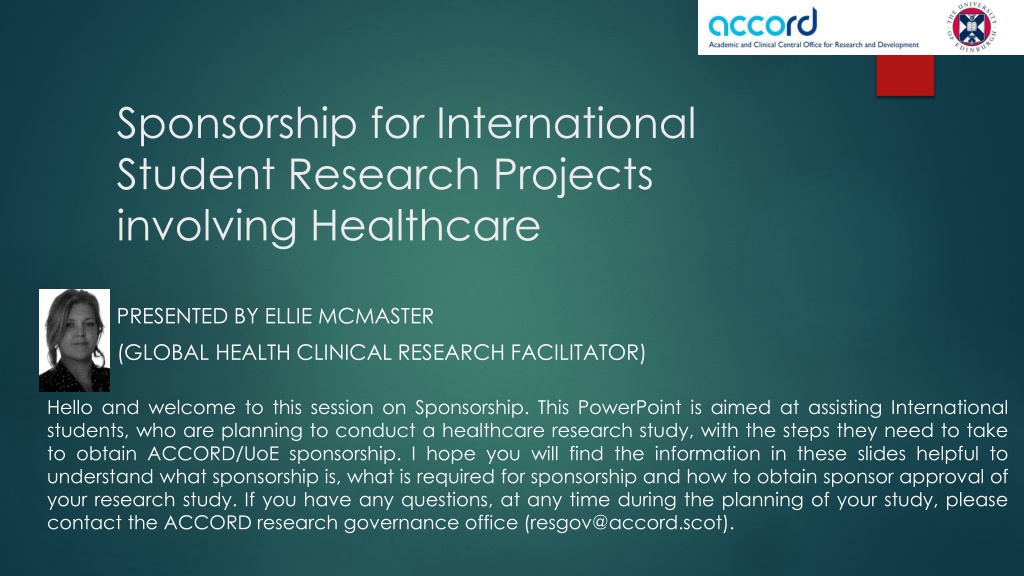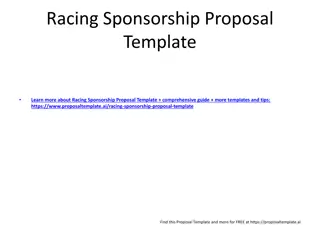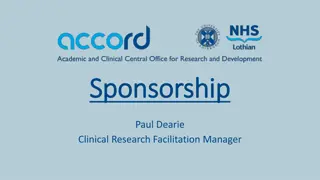Understanding Sponsorship for International Student Healthcare Research Projects
Welcome to a presentation on obtaining sponsorship for international student healthcare research projects. Learn about ACCORD, sponsorship requirements, sponsor responsibilities, and the difference between sponsorship review and ethics review. Get insights on how the University of Edinburgh supports healthcare research studies and the essential steps for obtaining sponsor approval. Contact ACCORD for any queries during your research planning.
Download Presentation

Please find below an Image/Link to download the presentation.
The content on the website is provided AS IS for your information and personal use only. It may not be sold, licensed, or shared on other websites without obtaining consent from the author. Download presentation by click this link. If you encounter any issues during the download, it is possible that the publisher has removed the file from their server.
E N D
Presentation Transcript
Sponsorship for International Student Research Projects involving Healthcare PRESENTED BY ELLIE MCMASTER (GLOBAL HEALTH CLINICAL RESEARCH FACILITATOR) Hello and welcome to this session on Sponsorship. This PowerPoint is aimed at assisting International students, who are planning to conduct a healthcare research study, with the steps they need to take to obtain ACCORD/UoE sponsorship. I hope you will find the information in these slides helpful to understand what sponsorship is, what is required for sponsorship and how to obtain sponsor approval of your research study. If you have any questions, at any time during the planning of your study, please contact the ACCORD research governance office (resgov@accord.scot).
What is ACCORD? ACCORD is a joint office between University of Edinburgh (UoE) and NHS Lothian research governance staff, however all International healthcare research is managed solely by the UoE research governance team. There is no international healthcare research studies. ACCORD supports researchers throughout the lifecycle of their studies. ACCORD review and provide sponsorship for all Health and Social Care research we sponsor a broad spectrum of studies from Undergraduate and Postgraduate healthcare research studies to highly complex clinical drug trials. ACCORD is based within the Queen s Medical Research Institute which is part of the University of Edinburgh s College of Medicine and Veterinary Medicine. NHS Lothian involvement in
What is a Sponsor? The Sponsor is the institution or organisation which takes on the legal responsibility for the initiation and overall management of a healthcare research study. The Sponsor is not necessarily the funder (although the sponsor must ensure the research study is sufficiently funded). The University of Edinburgh is the Sponsor for all international healthcare research studies where the international student is enrolled in a UoE Undergraduate However, there may be some exceptions where UoE may not be the sponsor of a student research study (see Examples in Slide 13). or Postgraduate Course.
What are the Sponsors responsibilities? The Sponsor has a number of responsibilities. Some examples include: the project is ethical, participant wellbeing, and data integrity. Ensuring legal, feasible and safeguards To provide insurance and indemnity for all research studies. Ensuring that correct regulatory and/or ethical approvals are in place prior to commencement of the study. Ensuring the correct legal/contractual agreements are in place (if required). Ensuring that effective procedures and arrangements are kept in place and adhered to for reporting (e.g. progress reports, safety reports, protocol deviations/violations/serious breaches, data breaches).
Is Sponsorship Review the same as Ethics Review? No Sponsorship is a research governance process to ensure research is conducted to the highest standards and complies with the relevant legal frameworks. In practice, research governance/sponsorship is a process to help assess, record and monitor research activity, and includes a number of compliance checks before the research can begin. Research ethics are the considerations that researchers, conducting a research study, must make throughout the research process - from the initial idea, through data collection, reporting and disseminating the results of the study. In practice, research ethics are moral principles that guide researchers to conduct and report research without deception or intention to harm the participants of the study or members of the society as a whole, whether knowingly or unknowingly. Sponsorship must be obtained prior to any ethics committee review.
Does my study need Sponsorship? Is it Health or Social care research? Health or Social care research involves humans in some way (e.g. human participants, human data and/or human tissue). Health or Social care research aims to find out new knowledge that could lead to changes to health, treatments, policies or care. All Health or Social care research must have a Sponsor. Literature Reviews, Service Evaluations and Clinical Audits are not considered to be research and therefore do not require sponsorship. How do I determine if my study falls within the definition of Research or not? Click this link for helpful guidance: http://www.hra- decisiontools.org.uk/research/docs/definingresearchtable_oct2017-1.pdf See also Examples of Research, Service Evaluations and Clinical Audits provided on slides 10, 11 and 12.
My study is Health or Social care Research how do I obtain Sponsorship? First, please complete the relevant study document templates, which are available to download from the ACCORD website under section GH001 here: SOPs | Accord (right click to open hyperlink) You should determine the relevant Protocol template to complete and whether your study requires a Participant Information Sheet and Consent Form. For example, some retrospective data analysis studies using anonymised data only require the Data Only Protocol template to be completed and don t necessarily require a Participant Information Sheet/Consent Form (unless specifically requested by local ethics). If there is a local ethics requirement in the country where the study is being conducted to complete the local PIS/CF templates, please ensure you comply with this local request. All participant-facing documents need to be completed. This includes any advertisement materials (e.g. study Poster, study Leaflet), Questionnaires/Scales, Interview Topic Guide, Participant Invitation Letter, Participant Appointment Letter, Social Media Content etc. Once you have completed your study document set, please send them to resgov@accord.scot and they will be assigned a Sponsor Reviewer who will take your study forward for Sponsorship.
What does a Sponsorship Review Involve? Student researcher submits completed set of study documents to resgov@accord.scot Sponsor agrees review timelines (usually 10 working days) Sponsor reviews documents and provide comments Sponsor returns study documents with comments to student Student makes updates to study documents, and completes any additional requests from sponsor. Student returns updated study documents to sponsor for final review. Sponsor reviews amended study documents. Sponsor provides sponsor approval via email Student submits final documents to local ethics committee and to UoE Programme ethics where relevant. Student provides sponsor with a copy of ethics approvals once they are received. Student finalises documents in preparation for ethics submission.
Ethics Guidance International student health or social care research studies require ethics approval from the local ethics committee in the country where the study is being conducted, in addition to a UoE Programme ethics review. Please follow the guidance provided by your UoE Programme with regard to their UoE ethics review.
Examples of Research Studies requiring Sponsorship: Does the administration of paracetamol to patients awaiting MRI significantly increase image quality? An uncontrolled trial of a new procedure in a clinic setting What do experienced veterinary practitioners think are the training needs for vets in relation to rabies prevention in low and middle income countries? An online Delphi study with experienced vets, selecting and prioritising core elements of training for new vets working in that setting. What factors lead to admittance to a mental health in patient service? Analysis of anonymised patient records and interviews with consultant psychiatrists.
Examples of Service Evaluations which do not require Sponsorship: What are the outcomes following cleft palate surgery in a hospital if [technique A] or [technique B] is used? A survey of former patients (parents) asking about physical health outcomes and past surgical experience. Are Black, Asian or Minority-Ethnic people more likely to undergo Caesarean section than White people, at the Hospital Maternity Unit? An analysis of routine data collected by the Unit to examine rates Caesarean section by ethnicity
Examples of Clinical Audits which do not require Sponsorship: Does the local Clinic see patients within 30 days of referral? An analysis of routine data collected by the clinic to see how actual waiting times relate to the clinic s own 30-day standard. This could include a comparison of adherence over time (e.g. pre-pandemic, during the pandemic). Do patients receiving abdominal surgery in the local Hospital routinely receive (Drug X) within 12 hours post-surgery? An analysis of routine data collected by the hospital to see how prescribing relates to international recommendations. This could include a comparison of adherence to the standard dependent on the gender of the patient, or the specific surgical procedure being undertaken.
Examples where UoE may not be the Sponsor of an International Student Research Study In most cases, international student healthcare research studies will be sponsored by UoE as the student is enrolled in a UoE Undergraduate or Postgraduate Programme and UoE is the awarding institution. However, occasionally there are some exceptions to this rule. For example: 1. The student may be employed by a healthcare organisation in their local country, such as a hospital or pharmaceutical company, and this organisation may decide to take on the sponsorship role locally and have an active lead role in the management and conduct of the student s study. 2. The student may wish to conduct a research study which is embedded in a wider research project (i.e. the student s study may be a sub-study to a protocol of a wider research project). If this wider research project is already sponsored by another institution or has already obtained the necessary approvals locally, the student should seek to obtain approval from the original sponsor and ethics committee of this wider research project. If you are unsure about sponsorship arrangements of your study after discussing with your supervisor, please contact resgov@accord.scot to discuss further.
Useful Resources (right click on hyperlinks below to open) ACCORD website: www.accord.scot ACCORD Supporting Documents for Researchers: SOPs | Accord Research Integrity: Research integrity | The University of Edinburgh Data Protection: Data Protection | The University of Edinburgh Data Support: OneDrive for Business | The University of Edinburgh Information Security: Information Security | The University of Edinburgh If you are unsure about the sponsorship arrangements for your study after discussing with your supervisor, please contact the ACCORD research governance team (resgov@accord.scot) to discuss further.






















